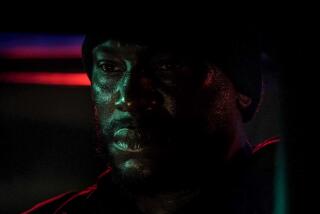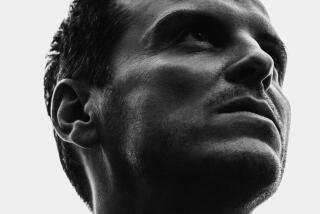STAGE REVIEW : QUESTIONS FROM ‘SPLIT SECOND’
- Share via
A black cop loses his cool and shoots a handcuffed white suspect for taunting him about his race. There are no witnesses; the cop can probably get away with it. Does he turn himself in or does he cover himself?
Dennis McIntyre’s “Split Second” at the New Mayfair Theatre ought to involve us from the moment that Denzel Washington, as the off-duty cop, gets the drop on Michael Daniel Russo as the insolent car thief. First, we should feel the physical tension of what’s about to happen. Then, we should feel a concern to know why it happened and what the aftermath will be.
Why should a black cop, who must have heard all these racial slurs before, suddenly hear them as if for the first time--and start blasting? Was it because this white man actually dared him to pull the trigger, or was it a sudden overmastering disgust with whites in general?
Moreover, what’s next for the cop? He may get away with what he has done, but what kind of mark has it left on him? Is this the end of his moral life or the beginning of it? Or will things go on much as usual for him, with only an occasional nightmare?
Those are some of the concerns that ought to be in the air during a performance of “Split Second,” but Tuesday night’s performance felt more like an early run-through, with the lines and the blocking in place, but the characterizations only roughed out. The fiction never really took hold, and the questions remained abstract.
Perhaps director Hal Scott wanted a certain bareness, in order to counter a script that tries too hard to answer every question the viewer might possibly have about the young cop and his family. Everybody--the cop’s father (John Amos), his wife (Alfre Woodard), his buddy (Eugene Lee)--gets at least one “big speech” to tell us where he or she is coming from, often involving material that can’t be news to the person to whom it is delivered.
Scott sees that the play has too many words, and tries to compensate by subtracting behavior--the unspoken, unconscious ways in which people relate to a particular space and to particular companions. Working on an abstract set by Michael Devine, Washington and the other actors emote at each other, more or less impressively; but they rarely touch each other under the words, and consequently never touch us.
Even the tension of the first scene gets lost when Washington stands facing the impudent Russo without giving us a clue as to what’s going through his head: He might be waiting in the outfield for the next batter. We don’t want mugging here (he and Amos aren’t free of it later, in their parting-of-the-ways scene), but we do need a way into the character’s state of mind.
Woodard can be a burning actress. Confined entirely to her lines, she comes off here as a shrill and rather pretentious nag, with Lady Macbeth overtones. Lee and Jason Bernard as a police examiner also have problems making their lines sound like talk, rather than “lines”--again, there’s that feeling of characters just beginning to be explored.
For all its wordiness, “Split Second” remains an interesting play, a play of conscience and pain. I’d like to see it in a staging that takes it all the way to the mat. This one only circles it. 214 Santa Monica Blvd., Santa Monica. (213) 451-0621.
More to Read
The biggest entertainment stories
Get our big stories about Hollywood, film, television, music, arts, culture and more right in your inbox as soon as they publish.
You may occasionally receive promotional content from the Los Angeles Times.










